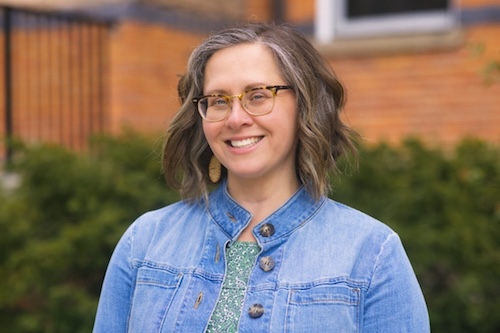Kristin Arola has been named director of American Indian and Indigenous Studies, or AIIS, at Michigan State after serving as its interim director since fall 2022. Arola is also the inaugural Karen L. Gillmor Endowed Professor in Professional and Public Writing and a professor in the Department of Writing, Rhetoric and Cultures.
 Arola is a first-generation descendant of the Keweenaw Bay Indian Community of the Lake Superior Band of Chippewa Indians located in Michigan’s western Upper Peninsula.
Arola is a first-generation descendant of the Keweenaw Bay Indian Community of the Lake Superior Band of Chippewa Indians located in Michigan’s western Upper Peninsula.
“Together, I believe we can make MSU a premiere institution that supports American Indian and Indigenous students, staff, faculty and Tribal Nations,” Arola said. “AIIS will continue to offer a high-quality minor and graduate certificate to support faculty engaging in teaching and research in Indigenous studies and to build toward greater collaborations and visibility across campus.”
Arola is an active member of Educating Anishnaabe: Giving, Learning and Empowering, an Indigenous faculty-staff association at MSU. She served as a co-principal investigator on a National Science Foundation grant focused on partnering with rural and Indigenous communities to enable them to achieve energy sovereignty, or the right to make their own decisions about energy implementation in their communities. Arola currently serves as co-principal investigator on the Anishinaabemowin portion of the Less Commonly Taught Languages grant funded by the Andrew W. Mellon Foundation.
An undergraduate alumna of the University of Michigan, she received a bachelor’s degree in English and a master’s and doctorate in rhetoric and technical communication from Michigan Technological University. Prior to her work at MSU, Arola worked at Washington State University, where she directed the Digital Technology and Culture undergraduate program and served as director of graduate studies for the Department of English.
“I have had the pleasure of knowing and working closely with Dr. Arola on multiple programs and projects over the past seven years, and I look forward to our continued collaboration,” said Kevin Leonard, director of the Native American Institute at MSU. “She is the perfect choice to lead the American Indian and Indigenous Studies program into the future. Beyond her impeccable academic record, she brings to this role an energy and willingness to look at things from a fresh perspective, drawing on traditional ways of knowing and understanding that I believe will help AIIS move from an undergraduate minor to a major at MSU.”
As a trained rhetorician and writing studies specialist, Arola looks at how alternative writing processes and products can expand the range of voices that are included and valued. Specifically, she explores how marginalized users make meaning in digital spaces and Tribal communities’ decision-making practices and offers Indigenous methodologies as a productive disruption to rhetorical theories. To do this, she explores how worldviews shape the processes and products we individually and collectively value for making meaning and sharing research.

“Together, I believe we can make MSU a premiere institution that supports American Indian and Indigenous students, staff, faculty and Tribal Nations,” Arola said. “AIIS will continue to offer a high-quality minor and graduate certificate to support faculty engaging in teaching and research in Indigenous studies and to build toward greater collaborations and visibility across campus.”
Arola is an active member of Educating Anishnaabe: Giving, Learning and Empowering, an Indigenous faculty-staff association at MSU. She served as a co-principal investigator on a National Science Foundation grant focused on partnering with rural and Indigenous communities to enable them to achieve energy sovereignty, or the right to make their own decisions about energy implementation in their communities. Arola currently serves as co-principal investigator on the Anishinaabemowin portion of the Less Commonly Taught Languages grant funded by the Andrew W. Mellon Foundation.
An undergraduate alumna of the University of Michigan, she received a bachelor’s degree in English and a master’s and doctorate in rhetoric and technical communication from Michigan Technological University. Prior to her work at MSU, Arola worked at Washington State University, where she directed the Digital Technology and Culture undergraduate program and served as director of graduate studies for the Department of English.
“I have had the pleasure of knowing and working closely with Dr. Arola on multiple programs and projects over the past seven years, and I look forward to our continued collaboration,” said Kevin Leonard, director of the Native American Institute at MSU. “She is the perfect choice to lead the American Indian and Indigenous Studies program into the future. Beyond her impeccable academic record, she brings to this role an energy and willingness to look at things from a fresh perspective, drawing on traditional ways of knowing and understanding that I believe will help AIIS move from an undergraduate minor to a major at MSU.”
As a trained rhetorician and writing studies specialist, Arola looks at how alternative writing processes and products can expand the range of voices that are included and valued. Specifically, she explores how marginalized users make meaning in digital spaces and Tribal communities’ decision-making practices and offers Indigenous methodologies as a productive disruption to rhetorical theories. To do this, she explores how worldviews shape the processes and products we individually and collectively value for making meaning and sharing research.